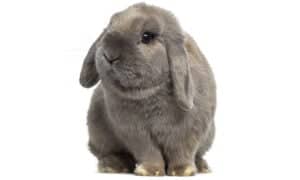| Best for | Product |
|---|---|
| Best Overall | KAYTEE Timothy Complete Rabbit Food |
| Best Timothy-Based Pellets | Sherwood Pet Health Timothy Pellet Adult Rabbit Food |
| Best High Fiber | Oxbow Essentials Adult Rabbit Food |
| Best for House Rabbits | SCIENCE SELECTIVE House Rabbit Food |
| Best for Young Rabbits | SCIENCE SELECTIVE Junior Rabbit Food |
Getting your rabbit’s nutrition right is critically important for their welfare. Bunnies have very delicate digestion and have precise dietary requirements. They need a diet that is mainly made up of high-quality hay but they also need small amounts of high-quality commercial rabbit food. The problem is that there are so many to choose from it can be hard to know where to start. Our guide will help you choose the best rabbit food for bunnies with different feeding preferences, ages, and lifestyles. With our help, you can select a food with the correct nutritional profile for your little pet’s needs.
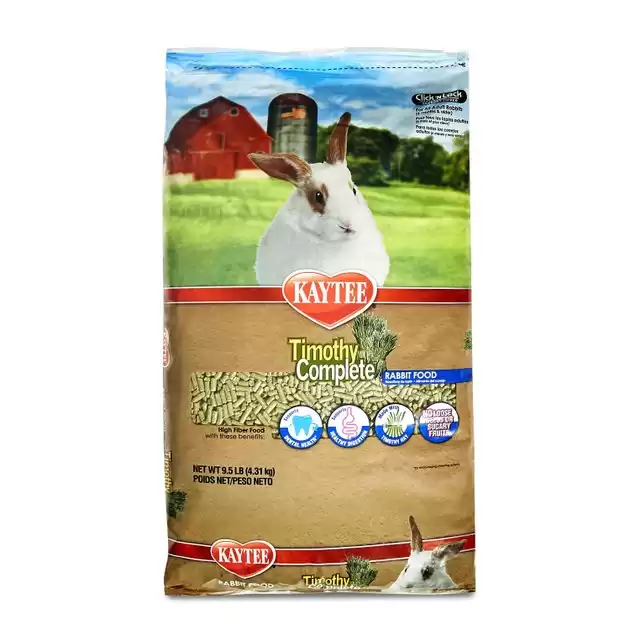 Check Chewy Check Amazon
Check Chewy Check Amazon- Made from nutritious Timothy hay
- Taste and texture appeal to most rabbits
- No artificial additives
- Added vitamins and minerals
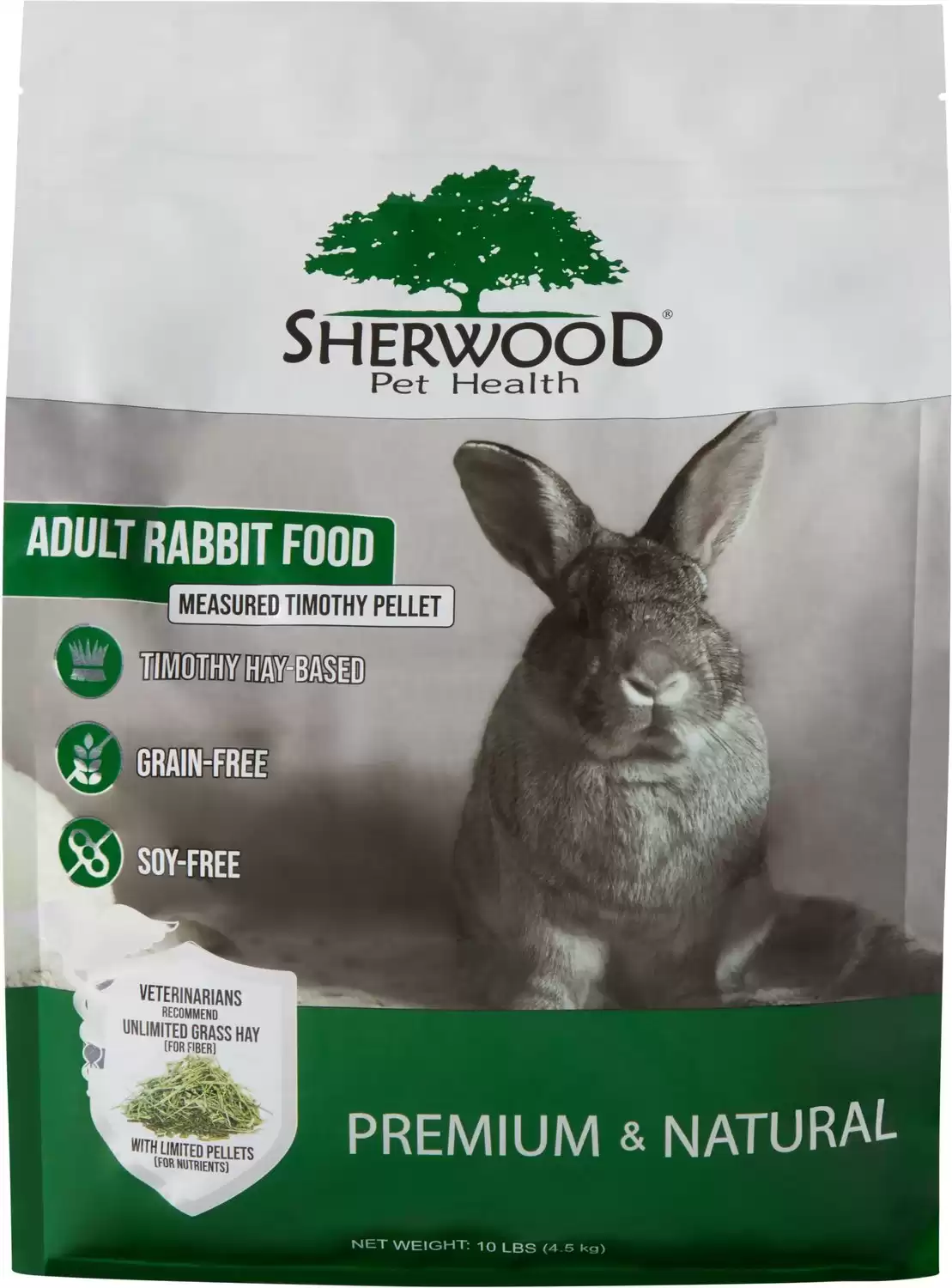 Check Chewy
Check Chewy- Added vitamins and phytonutrients
- Contain only 12% protein
- No cheap fillers, gluten or soy
- Use as supplemental food only
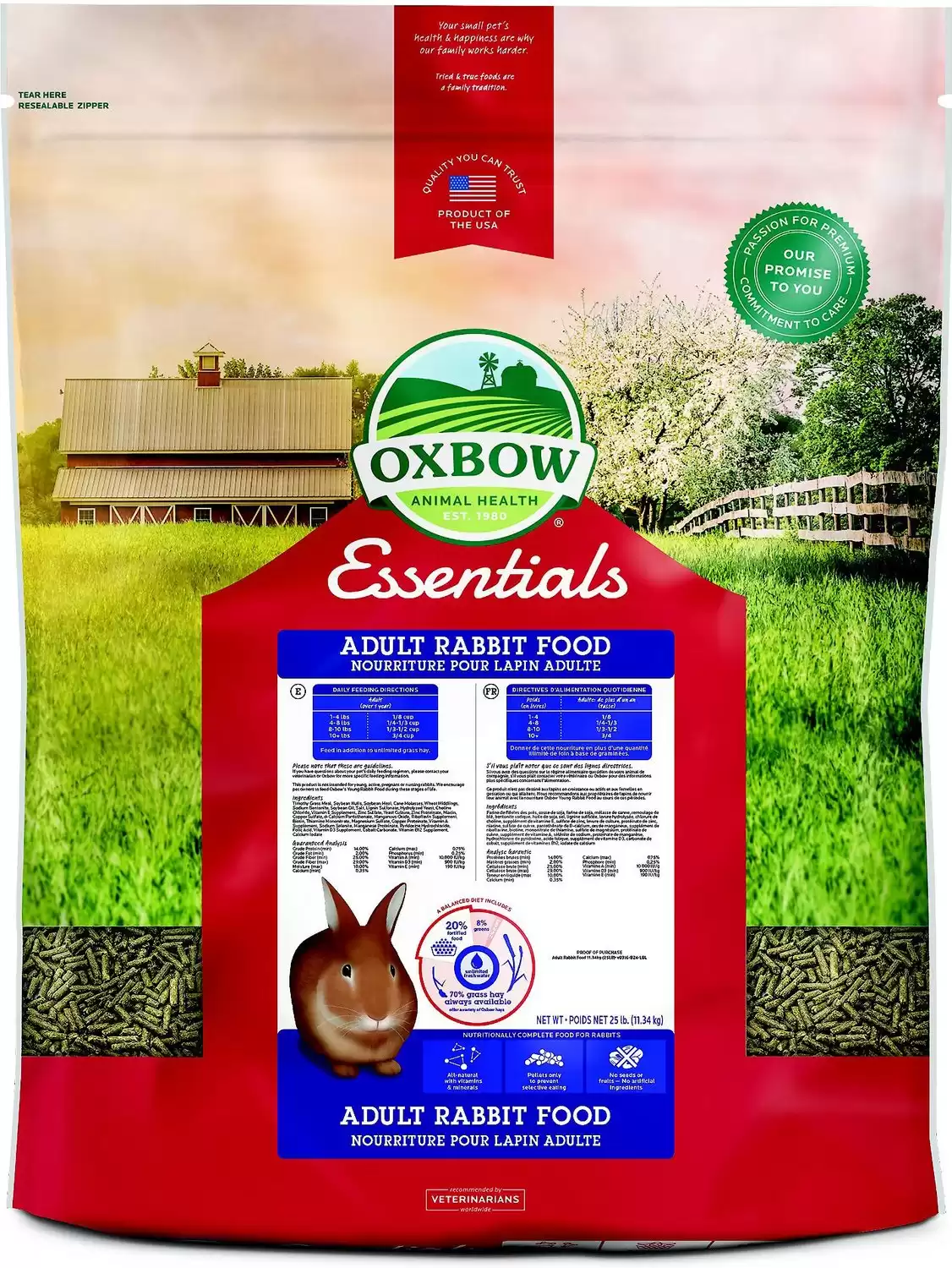 Check Chewy Check Amazon
Check Chewy Check Amazon- Contains a minimum of 25% fiber
- Timothy grass is the main ingredient
- Added vitamins and minerals
- Pellets prevent selective eating
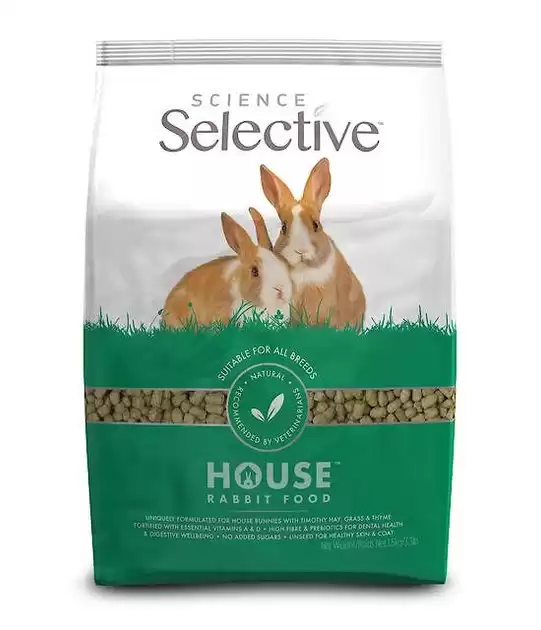 Check Chewy Check Amazon
Check Chewy Check Amazon- Made from nutritious Timothy Hay grass and thyme
- No added sugar to control weight
- Added vitamins
- Formulated specifically for indoor rabbits
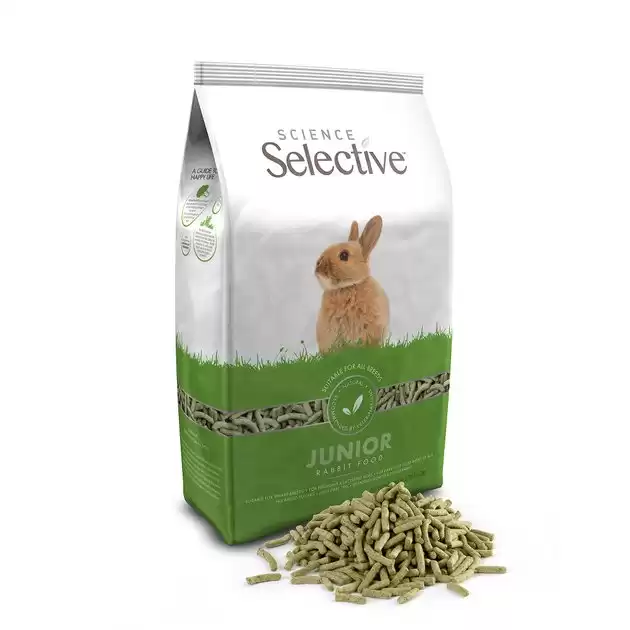 Check Chewy
Check Chewy- Main ingredient is Alfalfa hay
- No artificial ingredients or sugar
- For rabbits up to 20 weeks old
- Added vitamins and herbs
A-Z-Animals Top Picks for Rabbit Food
#1 Best Overall: Kaytee Timothy Complete Rabbit Food
From our research, the overall best rabbit food is the Kaytee Timothy Complete Rabbit Food based on the nutritious timothy hay it contains and its great fiber content.
This has a superior nutritional profile to most other rabbit foods on the market but is reasonably priced, plus the taste and texture appeal to most rabbits.
There are no artificial additives in this food and Kaytee uses a natural preservation process that retains the natural goodness of the ingredients. The low-protein and the low-calcium recipe is ideal for rabbits. It provides plenty of fiber, probiotics, and prebiotics for healthy digestion which is always an area of concern for these little pets. The added vitamins and minerals support overall health. These pellets are designed to encourage healthy chewing and help with dental health and there are no loose seeds to get stuck and cause dental issues.
The only drawback to this food is that sometimes there are the occasional seeds mixed in with the pellets. This is because Kaytee manufactures other types of food, which can result in some contamination.
Pros and Cons of the Kaytee Timothy Complete Rabbit Food
| Pros | Cons |
|---|---|
| This food is a low-protein and the low-calcium recipe. | Sometimes there are seeds mixed in with the pellets. |
| It is a great source of fiber. | |
| It contains prebiotics and probiotics to promote digestion. | |
| It has added vitamins and minerals to support overall health. | |
| The pellets are designed to encourage chewing. |
- Made from nutritious Timothy hay
- Taste and texture appeal to most rabbits
- No artificial additives
- Added vitamins and minerals
2. Best Timothy-Based Pellets: Sherwood Pet Health Timothy Pellet Adult Rabbit Food
If you are looking for supplemental food for a rabbit that is happily eating plenty of timothy hay, then the Sherwood Pet Health Timothy Pellet Adult Rabbit Food is the perfect choice.
This food is packed with vitamins and phytonutrients and has only 12% protein. The impressive (24%) fiber content is matched with minerals and omega oils for all-around rabbit health. Plus, there are no cheap fillers, gluten, or soy in it.
The fat content of this food is higher than most other foods so it is only suitable for rabbits that are getting most of their nutrition from hay. It should be used as supplemental food only because feeding large amounts to rabbits will result in too much weight gain.
Pros and Cons of the Sherwood Pet Health Timothy Pellet Adult Rabbit Food
| Pros | Cons |
|---|---|
| This food has a 24% fiber content. | It has a high fat content so should only be used as a suplemental food. |
| It contains only 12% protein. | |
| It is packed with vitamins and phytonutrients. | |
| This food contains minerals and omega oils for all-around good health. | |
| It is free from fillers, gluten, and soy. |
- Added vitamins and phytonutrients
- Contain only 12% protein
- No cheap fillers, gluten or soy
- Use as supplemental food only
3. Best High Fiber: Oxbow Essentials Adult Rabbit Food
Rabbits thrive on a high fiber diet and so we have no hesitation in recommending the Oxbow Essentials Adult Rabbit Food.
This food contains a minimum of 25% fiber which is much higher than most other rabbit foods that are available. Timothy grass is the main ingredient so it delivers the optimum protein and calcium-to-phosphorous levels. It’s made from fresh and natural ingredients with added vitamins and minerals. There are no seeds or fruits and the pellets are all the same to prevent selective eating. Your rabbit’s immune system and digestive system will also be supported by the antioxidants and prebiotics in this food.
Unfortunately, this food does contain soy which is not ideal. Additionally, some customers have reported that their pets will not eat this food.
Pros and Cons of the Oxbow Essentials Adult Rabbit Food
| Pros | Cons |
|---|---|
| This food contains a minimum of 25% fiber. | It contains soy. |
| It features timothy grass as the main ingredient. | Not all pets like this food. |
| It has optimum protein and calcium-to-phosphorous levels. | |
| It contains antioxidants and prebiotics. | |
| This food is in pellet form which prevents selective eating. |
- Contains a minimum of 25% fiber
- Timothy grass is the main ingredient
- Added vitamins and minerals
- Pellets prevent selective eating
4. Best for House Rabbits: Science Selective House Rabbit Food
House rabbits have a less active lifestyle and therefore tend to put on weight quite quickly. Therefore, we recommend the Science Selective House Rabbit Food.
This recipe is based on nutritious timothy hay and thyme. This provides a variety of tastes that mimics what a rabbit would experience when foraging outdoors. There are vitamin and mineral supplements for overall health but no added sugar to control weight. You’ll also find that it contains linseed for a healthy skin and a shiny coat.
The only drawback to this food is that sometimes there can be a lot of dust in the bottom of the bag.
Pros and Cons of the Science Selective House Rabbit Food
| Pros | Cons |
|---|---|
| This food contains timothy hay and thyme. | Sometimes there is a lot of dust in the bottom of the bag. |
| It provides a variety of tastes to mimic what a rabbit would experience outdoors. | |
| It contains vitamins and minerals for overall good health. | |
| It contains linseed for a healthy skin and a shiny coat. | |
| It does not have any added sugar. |
- Made from nutritious Timothy Hay grass and thyme
- No added sugar to control weight
- Added vitamins
- Formulated specifically for indoor rabbits
5. Best for Young Rabbits: Science Selective Junior Rabbit Food
If you are lucky enough to have a little bunny in your home, you will want to make sure that you are feeding them properly. Therefore, we recommend the Science Selective Junior Rabbit Food as our preferred food for younger rabbits as the main ingredient is alfalfa hay.
Junior rabbits have different nutritional needs than adult rabbits. Up until the age of about seven months, baby bunnies do best on alfalfa hay because it is high in protein for growth and has plenty of calcium and fiber.
This food features a blend of vitamins and minerals which are essential to support a developing immune system as well as plenty of amino acids. There are no artificial ingredients and no sugar in it. You can feed this to rabbits up to 20 weeks of age. Because it is so palatable, it encourages little bunnies to eat and all the pellets are the same so you don’t have to worry about selective feeding. Plus, this food is suitable for pregnant or lactating females.
Although this food has a lot going for it, some customers have reported that their rabbits simply will not eat it.
Pros and Cons of the Science Selective Junior Rabbit Food
| Pros | Cons |
|---|---|
| This food is suitable for rabbits up to 20 weeks old. | Not all rabbits like this food. |
| It features vitamins and minerals to support the immune system. | |
| It is free from artificial ingredients. | |
| It is suitable for pregnant or lactating females. |
- Main ingredient is Alfalfa hay
- No artificial ingredients or sugar
- For rabbits up to 20 weeks old
- Added vitamins and herbs
Choosing the Best Rabbit Food: What to Look For
When choosing the best rabbit food for your little bunny, it is important that you understand the unique nutritional needs of rabbits. Rabbit’s digestion is very delicate and can be easily upset by the wrong diet.
There are seven important features that you should look for in every rabbit food that you consider. They are the main ingredient, added micronutrients, protein content, calcium content, fiber content, pellet style, and price. We unpick each of these important factors below.
Main Ingredient
The first named ingredient of the food should be timothy hay or alfalfa grass. This will provide all the energy that your rabbit needs. Alfalfa is best for younger rabbits that are still growing as it has more fat. Once your rabbit is over seven months, it should have food based on timothy hay.
Added Micronutrients
Just like their human owners, pet rabbits need a range of vitamins and minerals. Look out for foods that are fortified with a range of micronutrients. These are only needed in small amounts but are essential to keep your rabbit healthy.
Protein Content
Pet rabbits need between 12% and 16% protein. Their bodies cannot cope with high levels of protein. If your pet rabbit eats food with very high protein levels it can lead to enteritis (inflammation of the gut). Check out the protein content on the label before you buy.
Calcium Content
Rabbits have a very delicate balance of calcium in their bodies and the calcium content of their food must be carefully controlled. If rabbits ingest too much calcium, it enters their urine (pee) and can cause crystals in their kidneys. Minimum and maximum calcium levels are usually indicated on the label and you are looking for values of between 0.5% and 1%.
Fiber Content
Rabbits need a lot of fiber in their diet to keep their digestion healthy. Vets recommend that rabbit foods contain anywhere between 18% and 25% fiber. If rabbits do not get enough fiber, their gut slows down and they can get an intestinal blockage.
Pellet Style
Rabbits are not bothered about the color of pellets so there is no point in buying food that has artificial colorings. Crunchy pellets that look fresh are appealing to most rabbits who will enjoy the texture. Plain pellets are also best for a rabbit’s dental health and prevent selective feeding.
Price
As with all pet foods, you will find a range of prices for rabbit food. As a general rule, the more you spend, the better quality product you will get. Look out for deals when buying larger bags of feed but make sure that you will be able to use it in good time. Rabbits do not like stale food. Often, you can save around 5% on the advertised price by setting up a subscription.
The Different Rabbit Foods: Pros and Cons Compared
There are basically two types of rabbit food. The first is a mix of different types of seeds, hay, and perhaps fruit. The second is a uniform pellet that is a green-brown color. Let’s take a closer look at the advantages and disadvantages of both.
- Rabbit Mix: This is a popular type food with rabbit owners because it looks more appetizing and varied. Mixes often have hay and dried fruits mixed in and therefore provide a balanced diet with plenty of nutrients. The downside of this type of rabbit food is that they are often high in sugar, they may have artificial colors and they encourage the rabbit to selectively feed. They eat the bits that they like the taste and texture of and leave the rest. This means that they are not getting a balanced diet.
- Pellet Food: Pellet food encourages rabbits to eat a balanced diet because every pellet is the same. They have a nice crunchy texture and are easy to measure out. One of the cons of pellets is that they do not look that appealing and they can produce some dust at the bottom of the packet.
Introducing a New Food
As we have mentioned before, rabbits have very delicate digestions. We never recommend making a sudden change from one food to another. Instead, start to mix a small amount of the new food in with their old food. Over a period of several weeks, gradually decrease the proportion of the old food as you increase the proportion of the new food. This will give your rabbit’s gut a chance to adjust.
How Much Food to feed
Your rabbit’s main food should be high-quality hay such as timothy hay. This can be fed in unlimited quantities. Then, you can feed some commercial rabbit food as a supplement. Always follow the manufacturer’s feeding recommendations and, if you are not sure, consult your vet. If your rabbit appears to be putting on too much weight, reduce the amount of commercial food that you give them. You can also feed a rabbit small quantities of some vegetables or herbs but check first that they are not toxic to rabbits.
Up Next
- The Best Outdoor Rabbit House (Hutch): Ranked and Reviewed — Find the perfect hutch for your rabbit here.
- Best Cages for 2 (Or More!) Guinea Pigs — Do you have more than one guinea pig? Check out these cases for multiple guinea pigs.
- The Best Food for Guinea Pigs — Find the perfect food for your guinea pig with these highly-rated suggestions.
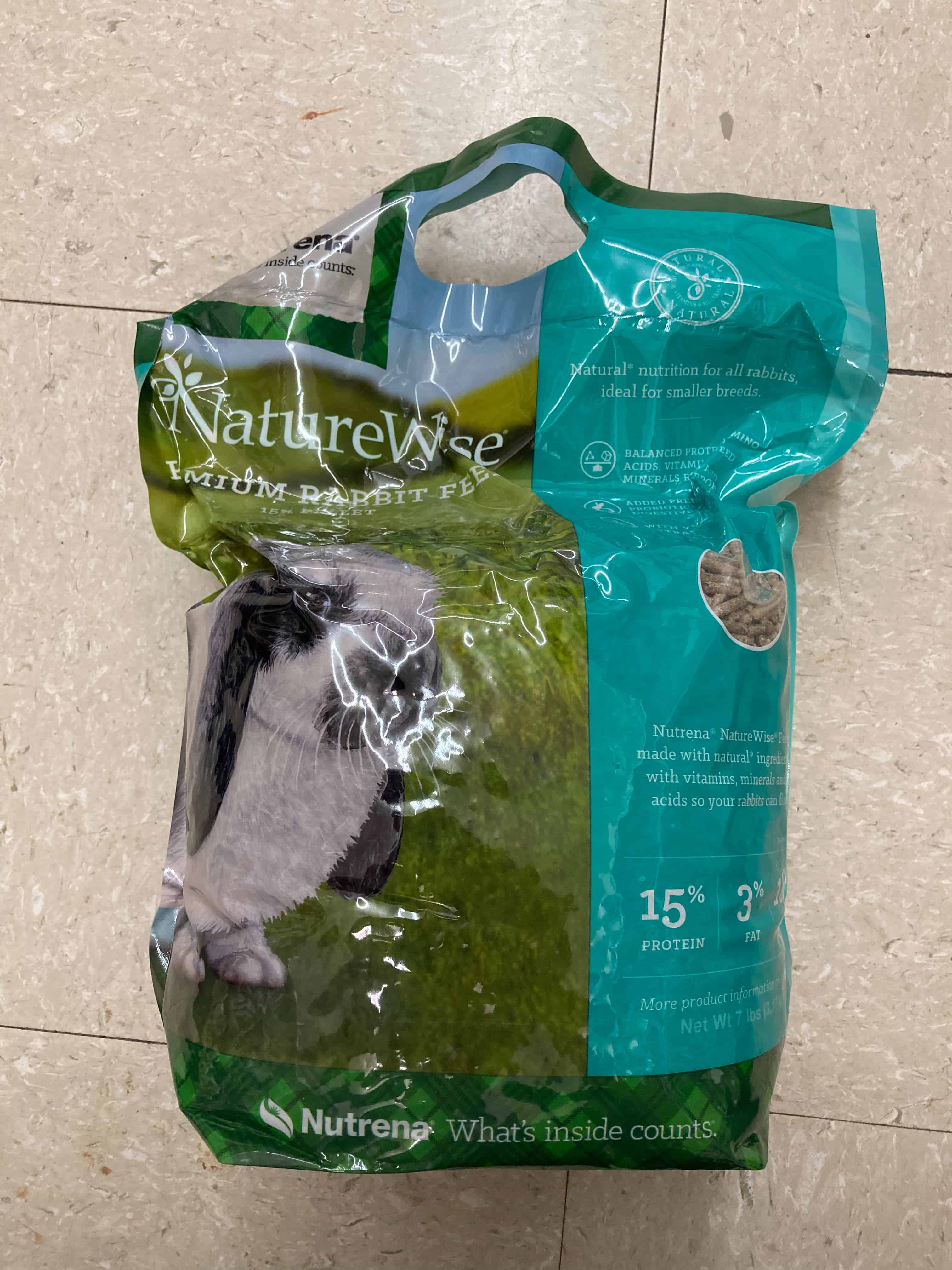
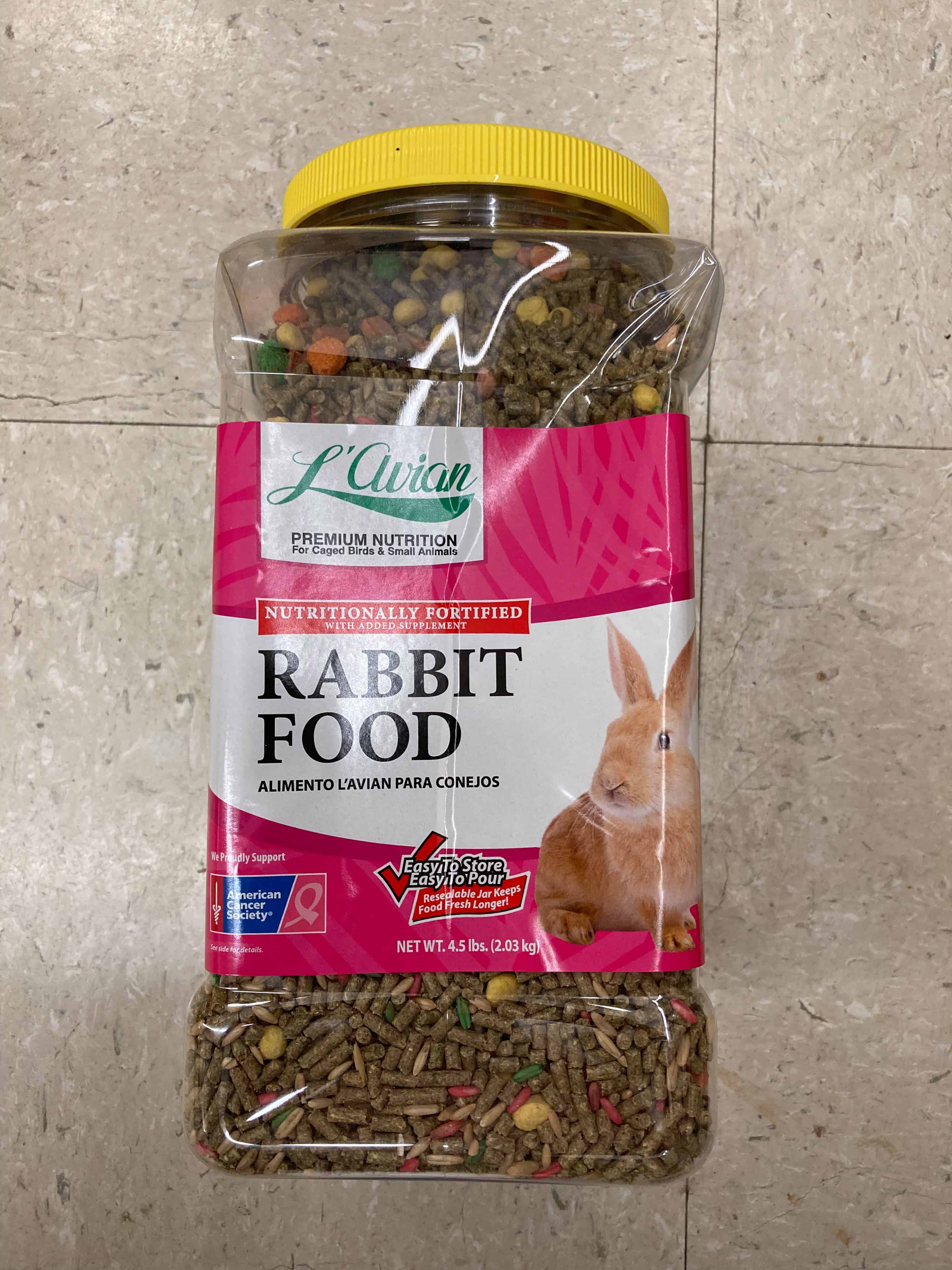
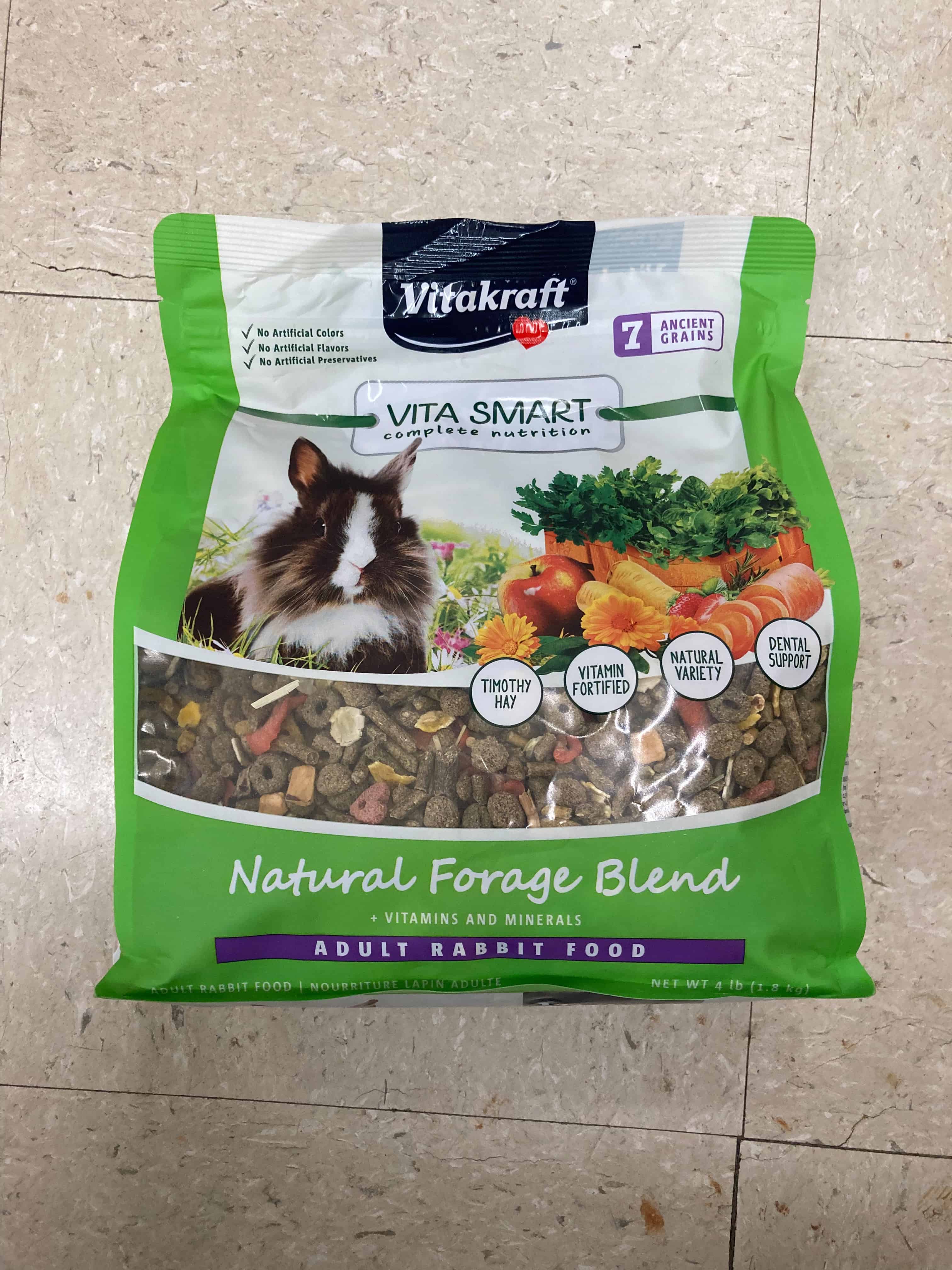
| Best for | Product |
|---|---|
| Best Overall | KAYTEE Timothy Complete Rabbit Food |
| Best Timothy-Based Pellets | Sherwood Pet Health Timothy Pellet Adult Rabbit Food |
| Best High Fiber | Oxbow Essentials Adult Rabbit Food |
| Best for House Rabbits | SCIENCE SELECTIVE House Rabbit Food |
| Best for Young Rabbits | SCIENCE SELECTIVE Junior Rabbit Food |
The Best Rabbit Foods For Your Pet FAQs (Frequently Asked Questions)
What is the best food for a rabbit?
The best food for rabbits is timothy hay although young rabbits will do well on alfalfa as it has a higher fat content. This can be fed in unlimited amounts. Rabbits also need a small portion of a commercial rabbit food and a small quantity of fruit, herbs or vegetables.
Which foods are dangerous for rabbits?
Avocado, iceberg lettuce and rhubarb are just three foods that are toxic to rabbits. Feeding rabbits scraps from the kitchen is not a good idea. Always research a food before giving it to your rabbit.
What fruit and veg can rabbits eat?
Your rabbit will love getting some fruit and vegetables but they are often full of sugar and must not be given to rabbits in large amounts. In particular, kale, carrot tops, parsley and strawberries go down very well with bunnies when fed to them in small amounts.
Thank you for reading! Have some feedback for us? Contact the AZ Animals editorial team.



